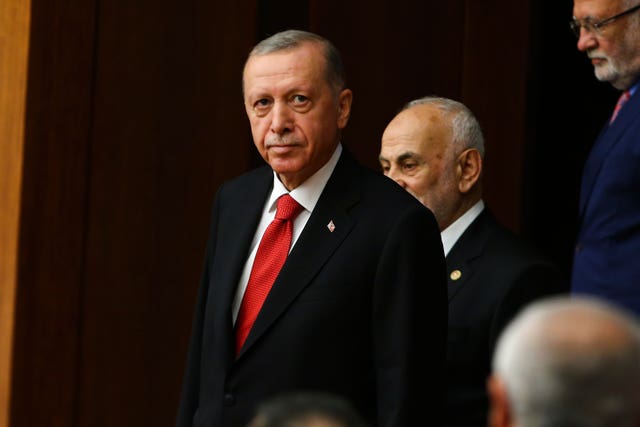
Turkey’s longtime leader, Recep Tayyip Erdogan, took the oath of office, ushering in his third presidential term that followed three stints as prime minister.
Mr Erdogan, 69, won a new five-year term in a runoff presidential race last week that could stretch his 20-year rule in the key Nato country that straddles Europe and Asia into a quarter-century.
The country of 85 million controls Nato’s second-largest army, hosts millions of refugees and played a crucial role in brokering a deal that allowed the shipment of Ukraine grain across the Black Sea, averting a global food crisis.
The republic will be celebrating its centennial in October, and so presiding over a new “Turkish century” became an important campaign slogan for Mr Erdogan.
During his inauguration ceremony at the presidential palace on Saturday, he hailed “the start of the Turkish century, a new period of glory for our country”.
“I invite all 81 provinces to come together in fraternity.
“Let us leave behind the resentments of the campaign.
“Let us find a way to make up for hurt feelings.
“Let’s all work together to build the Turkish century,” he said.

He also expressed his intention to introduce a new constitution, saying: “We will liberate our democracy from the present constitution produced by (the 1980) military coup, and strengthen it with a freedom-promoting, civilian and inclusive constitution.”
Dozens of foreign dignitaries attended the inauguration ceremony, including Nato secretary general Jens Stoltenberg and Carl Bildt, a high-profile former Swedish prime minister.
Stockholm hopes to press Mr Erdogan to lift his country’s objections to Sweden’s membership in the military alliance — which requires unanimous approval by all allies.
Turkey accuses Sweden of being too soft on Kurdish militants and other groups that Turkey considers to be terrorists.
Nato wants to bring Sweden into the alliance by the time allied leaders meet in Lithuania on July 11-12, but Turkey and Hungary have yet to endorse the bid.
Other leaders in attendance included Azerbaijan’s Ilham Aliyev, Venezuela’s Nicolas Maduro, Armenia’s Nikol Pashinyan, Pakistan’s Shahbaz Sharif and Libya’s Abdul Hamid Dbeibah, as well as several other leaders from Africa, Central Asia and the Balkans.
The inauguration ceremony was preceded by a swearing-in ceremony in parliament.
Supporters waited outside despite the heavy rain, covering Erdogan’s car with red carnations as he arrived. From there, a procession of cavalry in blue uniforms escorted the president’s convoy to the inauguration ceremony.
All eyes are on the announcement of his new Cabinet.
Its line-up should indicate whether there will be a continuation of unorthodox economic policies or a return to more conventional ones amid a cost-of-living crisis.
Mr Erdogan was sworn in amid a host of domestic challenges ahead, including a battered economy, pressure for the repatriation of millions of Syrian refugees and the need to rebuild after a devastating earthquake in February that killed 50,000 and levelled entire cities in the south of the country.
Turkey is grappling with a cost-of-living crisis fuelled by inflation that peaked at a staggering 85% in October before easing to 44% last month.
The Turkish currency has lost more than 10% of its value against the dollar since the start of the year.
Critics blame the turmoil on Mr Erdogan’s policy of lowering interest rates to promote growth, which runs contrary to conventional economic thinking that rates should rise to combat inflation.


Comments: Our rules
We want our comments to be a lively and valuable part of our community - a place where readers can debate and engage with the most important local issues. The ability to comment on our stories is a privilege, not a right, however, and that privilege may be withdrawn if it is abused or misused.
Please report any comments that break our rules.
Read the rules hereLast Updated:
Report this comment Cancel